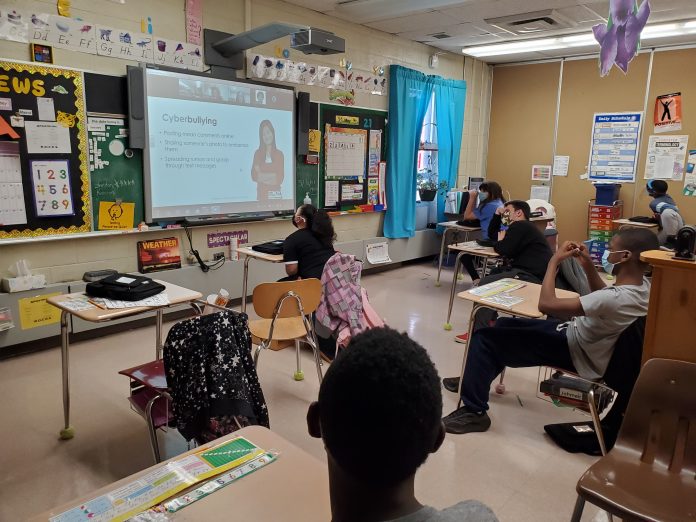Students at Neil A. Armstrong Middle School in Fairless Hills learned all about how to stay safe online thanks to the Network of Victim Assistance, or NOVA.
The organization, which has been working to support victims across Bucks County since 1974, brought its program “Internet Safety for Teens” to Amy Ewing and Cathy Rosta’s second period life skills students earlier this month. Held via Google Meet, the presentation discussed cyberbullying, picture sharing/sexting, online predators and where to turn for help.
According to the CDC, reports of cyberbullying are highest among middle school students. As reported by Rose & Gage, students with learning disabilities report greater rates of online victimization than their peers without disabilities. Ewing explained that her life skills class is made up of sixth-, seventh- and eighth-graders, whose academic levels range from kindergarten to third grade.
“Life skills students, like typical students, are aware of social media outlets, but do not always understand the dangers they may entail,” said Ewing. “It is important to educate these students of the benefits, as well as the dangers.”
Over the course of 50 minutes, NOVA educators Mary Ritcher and Tory Baram shared tips for practicing safe internet use, and what to do if a student finds themselves in a scary situation. First, they went in-depth about the concept of cyberbullying.
“Unlike face-to-face bullying, where you know who you’re dealing with and you know the subject matter at hand and could potentially resolve the situation right then and there, with cyberbullying, you might not know where it began,” said Baram.
She recommended that the students take a deep breath before stooping to the bully’s level and retaliating. Baram also talked about how to be an upstander. If a student receives an embarrassing picture, they can be an upstander by not resharing it.
“When you don’t respond, that kind of takes the power away from the person doing the bullying because they want you to react. They want you to get mad,” said Richter.
Next, students were informed about sharing pictures. They learned all about consent, and how they should ask permission before posting a photo of someone else, even if it’s a close friend or family member. Richter and Baram also touched on inappropriate pictures, and what the students should do if they’re an unsuspecting recipient.
“You want to tell an adult immediately because those things are not OK,” said Ritcher.
Students were then warned about online predators and how they strategically build trust with kids in order to take advantage. The predator, often an adult posing as a young person, will do their research on the child, learning all about their background and interests to make it seem like they have much in common. They’ll give compliments to seem like a friend.
“They groom by slowly gaining our trust. They use all these tricks to get us to trust and then they try to get us to do something inappropriate,” said Baram, adding that students should never meet someone they met online in person. “It’s important to listen to the voice in your head. If they give you a weird feeling, listen to it.”
Lastly, Baram and Ritcher urged the students to be careful about what they share online. Whether it’s an inappropriate picture or personal details such as a phone number or home address, information is nearly impossible to erase on the internet.
“When you take a tube of toothpaste and you squirt it out, you can’t get it back in the tube. It’s out there,” said Mary Worthington, M.Ed., primary prevention coordinator at NOVA. “It’s the same thing with information and pictures that we post.”
“Internet Safety for Teens” was coordinated by eighth-grade school counselor Karla Davis Jones, who works with NOVA to bring 60 presentations a year to the Bristol Township School District.
“Our No. 1 goal at Armstrong is to keep our kids safe,” she said. “Educating kids is so much more than the three subjects of reading, writing and arithmetic. It’s caring about children and their wellbeing, and giving them the tools to go out into the world.”
By educating children on internet safety, parents are also receiving a lesson. Oftentimes after a presentation, students tell their parents about what they learned, opening up further discussion in the household. Worthington said NOVA offers parent programs to help them start the conversation before something tragic happens.
“Kids are sometimes afraid to let their parents know that there’s a situation that is hurtful or possibly harmful to them. They’re afraid that if they tell their parents, either they’ll lose their device or they’ll lose the opportunity to use their device,” Worthington said.
She stressed that kids can always turn to NOVA for help by calling 800-675-6900, emailing [email protected], texting 267-323-4545 or using the online chat at novabucks.org.
Samantha Bambino can be reached at [email protected]


